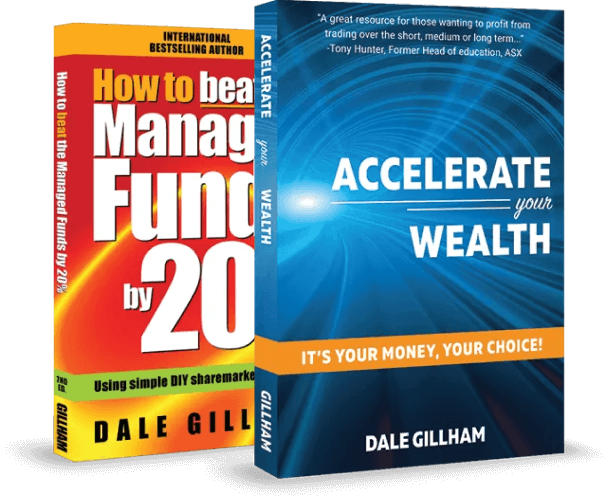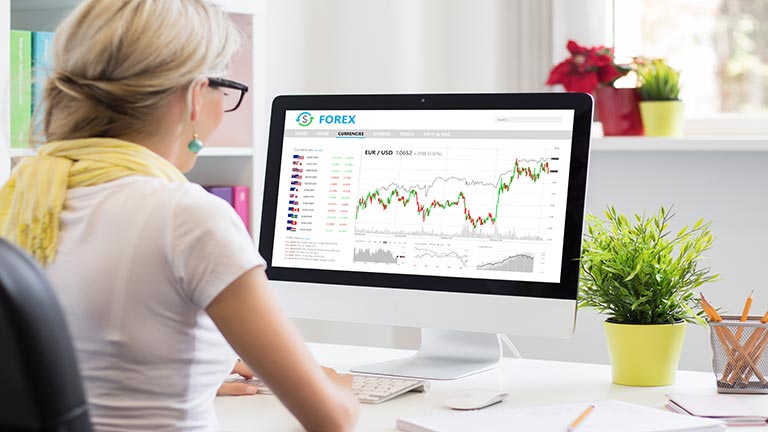Wealth Within Case Studies
Emma Murtagh
Emma Murtagh shares a review of the knowledge and skill she gained while studying with Wealth Within and how this has significantly improved the profits she takes from the market.
Emma is a 29-year-old trader who works part time in the tourism industry. With a background in mechanical engineering, Emma chose to pursue her career as a trader whilst working part time in order to spend more time with her friends, husband and beagle. Currently residing in Queensland, she has lived and worked overseas for 18 months and has been trading for the last 5 years.

How and when did you first become interested in the markets?
I first became interested in the markets when I started working as a mechanical engineer on a mine site. I met a fellow engineer who was interested in trading investments and we started to discuss this at length. Working in mining and being quite young, I had excess capital to invest, I wanted to do it wisely and start early.
And then what happened?
The very first ‘money book’ I read was Rich Dad Poor Dad by Robert Kiyosaki, where in his cash flow quadrant the investor struck a chord with me. I opened a trading account and signed up to an ASX game to work out technically how to enter and exit a trade. I started doing some minor trades, but these were unsuccessful – I really had no idea what I was doing or why! I didn't want to stick to a hit and miss approach – it stressed me out too much!
How have you been able to learn and educate yourself about the markets?
I wanted to learn how to trade properly, so I started listening to some ASX podcasts where Dale Gilham from Wealth Within was a guest. His straight-forward methodical approach made sense to me, so afterwards I got a copy of his book “How to Beat the Managed Funds by 20%”. After reading the book, I decided that I wanted control over my financial freedom. But first I needed a quality education.
I started the Diploma of Share Trading and Investment with Wealth Within in September 2013. After relocating to Chile for work, I finished the Diploma in 2015. Learning Spanish on the run, a new job and culture postponed the studies a bit. After that I took a break, before doing the Forex and CFD Trading Course. After a decent break, which let everything consolidate, I started the Advanced Trading Strategies Course with Wealth Within in January 2018.
The learning hasn’t stopped just at the education. The hours I’ve put in (and will continue to put in) to develop technical skills and my process, is very important to me.
Did you make mistakes when first starting out?
Of course, I didn’t know what I didn't know. The trades I took before my studies were both small positions under $1,000 – this is what I was willing to lose at the time.
The first one was ILU in October 2011. Initially, it started to trend up into a nice profit. However, I had no idea how far it would go and had no plan to get out. Needless to say, I held on to the stock and watched it fall, firstly back to my buy price and then way below until I was finally too uncomfortable to keep holding. So, I sold at a 32% loss. The stock continued to fall to 65% below my buy price, so that was an interesting lesson. ILU still hasn’t reached the price I bought it in 2011.
My other trade was purely on a tip. It was one of those penny dreadful stocks, trading under $1. It had low liquidity and when I finally decided to sell it, after it had fallen in price, there were no buyers to purchase my stock. I sold at a 21% loss. I learn with every trade I make. Most importantly, I have learnt the importance of being able to sell and the risks involved in continuing to hold.
Would you define yourself as a discretionary trader, a mechanical trader or a combination of both?
I would say that I’m 80% mechanical and 20% discretionary. I define mechanical trading as entering and exiting on set rules that work best for the stock, after having simulated these trading rules through back testing the historical data over a period. A mechanical trader would enter and exit the stock as these rules trigger. A discretionary trader will look at other factors such as price, pattern and time, and weigh up the risk to reward. I like to trade having a set of back tested rules as my baseline and then see where it is in the big picture.
Who have been some of your mentors and role models? What impact have these people made on you personally as well as on your trading style?
Both Dale Gillham and Janine Cox from Wealth Within have been fantastic mentors. Kay from Wealth Within has also worked closely with me from the beginning of my studies. I have worked more closely with Janine on my trading through the trading support. They all genuinely want to see me achieve my goals and challenge me to be the best trader.
My friend Ryan also joined up to the course around the same time as me and has been key in keeping me focused on my goal. Having someone that can speak the same language, be the unreasonable friend when I require a bit of a push and support my journey is extremely valuable.
Can you give us a brief overview of your trading style?
I have a methodical approach for how I analyze a stock and a selection of rules that I test to come up with the best strategy. I like to look at a stock over the last 5-10 years and simulate each strategy iteration to come up with the approach that will give me the best reliability, highest win loss ratio and highest overall profit.
Stocks do go through phases, so I may come up with a strategy that is successful 70% of the time, but then find the next trade is the losing trade. I then have more information and can better refine my strategy. I have developed strategies that proved to be the best approach. I have learnt that losses are a natural part of trading and I look at them as a business expense.
On most stocks, when preparing to trade, I combine this back tested strategy with where the stock is in terms of price, pattern and time. Taking in the overall position, I can see whether it’s a higher risk trade now compared to previous trades. Sometimes, I decide not to take the entry because of what the overall analysis is telling me and I wait patiently for further confirmation on a higher timeframe.
My trading plan is a template where I fill out all of these details, including my full analysis and commentary on the stock, where I think it will meet resistance, where it will find support and my general thoughts and feelings at the time. All of these comments are worth their weight in gold when I review a stock again following my exit. How else do you remember what you were thinking at the time of buying?
Is there any one trade (win or loss) that had a profound effect on your development as a trader? If so, what did you learn from the trade?
I can’t say that there was one trade in particular. About a year back, I wanted to review all of my positions to see if there were any patterns in my trading style that I could improve on. To do this, I needed my trading plans. I was certain I had them for every position. I searched my computer and could only find half. Not surprisingly, the trades where I couldn’t find my trading plans were the poorest performing in the portfolio. Such a lost opportunity!
I have learnt to get back to basics and make life simple for myself. It’s easier to refer to a printed page in a folder and it’s also a mental commitment to follow the trading plan once I hit that print button.
Can you tell us about your best and worst trades?
The best and worst trades are more than just the financial outcomes. Some of my best trades include those that generated small gains, say 5-10% because I followed my trading plan. Some of my worst trades are where I didn't follow my trading plan and ended up with a loss. I am trained to use stop losses, so my losses are always cut short. My worst trades were those two I mentioned previously, nothing has come close since.
I bought AWE for $0.57 and sold at $0.87 two months later for a 53% gain. I bought CSL for $117 about 2 years ago and it is has recently closed at $189. I’m currently just waiting for it to trigger my sell rules.
Would you classify yourself as a short-term or a long-term trader? What advice would you offer to people getting started as traders on the relative merits or otherwise of each?
Currently, I´m more of a long-term trader, but generally that’s up to the stock and my strategy. I don’t open and close positions within a day, and my past trades have ranged from on month to two years. I will start trading CFDs in the next year with a small portion of my total capital for cash flow.
My advice is - be honest with yourself and work out how much time you can dedicate to trading each week. You put most of your capital in your long-term portfolio as this will give you the highest return in dollars over time, so this is first priority. Once you can trade your long-term portfolio well, then look at trading short term. Break it down into stages and keep it simple.
What markets do you trade and which markets do you prefer? Do you have a favourite, and why?
I currently trade the ASX stocks, with the foundation of my portfolio in top 100. I also take positions out to the top 200 to 300, but these are limited to a certain number of positions within the portfolio. For me, there is plenty of opportunity within the Australian market without having to look elsewhere.
Global markets are in different phases and therefore require additional analysis. I like to keep it simple and I don’t need to worry about currency risk.
What makes your trading style different from others? What sets you apart from other traders?
I am a very organized and process driven person. I like to refine and improve both my trading process and strategy for the stock as I go. My trading plans and their content have continually developed and improved.
I focus on what I can do today to move me closer to my goal. I like to do something towards trading every day, be that reading, learning something new, reviewing old skills, back testing, actually trading, developing my process, and working on my trading psychology.
Do you have a favourite trading rule?
I don’t operate from a “go to” trading rule that can be applied to any stock, as doing hours of back testing has shown me that one rule that can work great on one stock and not so well on another.
Instead, I have a variety of base line rules that I use including Dow Theory, Gann Theory and trend lines. I then see which works best and add or combine rules to improve the results.
Ed Seykota says, “Everybody gets what they want from the markets.” What do you ‘get’ from the markets?
Unlimited opportunity!
How has trading affected your lifestyle?
Currently, I’m working on increasing my trading capital, so I’m not withdrawing any of my returns from portfolio as income.
I’ve worked out how much money I would need in trading income to eventually replace my full time traditional ‘work’. The number was lower than expected. So, this has taken off the pressure of having to put work as my #1 priority.
I’m on a mission at the moment, so I’m putting in many hours – I’m fortunate to have a supportive husband, family and friends.
What books seminars and courses have you read or attended and which would you recommend?
I was fortunate to find Wealth Within early on in my search, so my only trading education (courses and seminars) have been with them. The team generally run annual workshops and I’ve attended about 5 over the years and had the pleasure of meeting so many wonderful fellow traders.
I really enjoy reading and find that audio books in the car are great. I generally have at least one audiobook and one printed book going at the same time. These books really have been important to my journey and some I have read multiple times.
What does the future hold for you?
I’ll keep increasing my trading capital in the next few years to enable me to eventually cut back on my traditional ‘work’ and take income from my trading profits. I plan to do this progressively and I see this starting in the next 3 to 4 years. That will mean I have time for my family and friends and the resources to travel more. After all, you can trade from anywhere!
Insights From Our Learning Centre


Learn the concepts as to how you can accelerate your wealth using simple DIY investment strategies that will enable you to take control of your investments. Dale Gillham, bestselling author, shows you how to invest with confidence to achieve very profitable returns.
Browse BooksOr Browse By Topic
5 Stars
Years in business delivering high-quality education
of students rate the quality of education as excellent or very good
of students recommend Wealth Within



